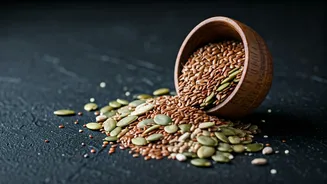Seeds and Cholesterol
Understanding the connection between seeds and cholesterol is the first step toward better heart health. Seeds are packed with nutrients such as fiber,
healthy fats, and antioxidants, which contribute significantly to lowering cholesterol levels. These components work together to reduce the amount of harmful LDL cholesterol in the blood, while simultaneously increasing the beneficial HDL cholesterol. By choosing the right seeds and integrating them into your meals, you can take a proactive approach to prevent or manage high cholesterol, improving your overall cardiovascular health. Furthermore, the inclusion of seeds in your diet aids in reducing inflammation, a contributing factor to heart disease.
Flaxseeds for the Win
Flaxseeds are nutritional powerhouses, particularly effective at lowering cholesterol levels. They are rich in soluble fiber, which binds to cholesterol in the digestive system, preventing its absorption into the bloodstream. This process helps to reduce the levels of LDL cholesterol, also known as 'bad' cholesterol. Additionally, flaxseeds contain omega-3 fatty acids, which can help reduce inflammation and improve heart health overall. Incorporating flaxseeds into your diet is simple; you can add them to smoothies, sprinkle them on salads, or mix them into baked goods. Remember to consume ground flaxseeds for optimal nutrient absorption, as the whole seeds may pass through the digestive system undigested.
Chia Seeds' Benefits
Chia seeds, like flaxseeds, are excellent sources of soluble fiber, which aids in lowering cholesterol. They absorb water and form a gel-like substance in the digestive tract, effectively trapping cholesterol and preventing its absorption. This, in turn, helps to reduce LDL cholesterol levels and improve heart health. Chia seeds also contain significant amounts of omega-3 fatty acids, contributing to reduced inflammation. Regular consumption of chia seeds can support cardiovascular health while providing other health benefits, like improved blood sugar control. Chia seeds are incredibly versatile; they can be added to yogurt, oatmeal, or used as a thickening agent in various recipes, making them an easy addition to your daily diet.
Hemp Seeds' Advantages
Hemp seeds stand out for their perfect balance of omega-3 and omega-6 fatty acids, which promote heart health by reducing inflammation and improving cholesterol profiles. Hemp seeds also contain arginine, an amino acid that helps relax blood vessels, leading to better blood flow and reduced blood pressure. These seeds are also a good source of fiber, which helps to lower cholesterol levels by preventing its absorption in the digestive tract. They also offer a complete protein source, providing all nine essential amino acids. Hemp seeds can be enjoyed in various ways, such as sprinkled on salads, added to smoothies, or eaten as a snack. Their nutty flavor makes them a tasty and nutritious addition to any diet.
Sunflower Seeds' Role
Sunflower seeds are packed with nutrients that support heart health, including vitamin E and phytosterols. Vitamin E acts as an antioxidant, protecting cells from damage and reducing inflammation. Phytosterols are plant compounds that help to lower LDL cholesterol by blocking its absorption in the intestines. Sunflower seeds also provide healthy fats and fiber, further contributing to improved cholesterol levels. Regular consumption of sunflower seeds may reduce the risk of heart disease by maintaining healthy cholesterol levels and improving overall cardiovascular health. They are easy to incorporate into your diet; enjoy them as a snack, add them to salads, or use them in baked goods.
Sesame Seeds and Health
Sesame seeds contain lignans, which have been shown to help lower cholesterol levels. Lignans can bind to cholesterol in the gut, thereby preventing its absorption into the bloodstream. These seeds are also a good source of fiber, which further supports the reduction of LDL cholesterol. Sesame seeds are rich in minerals like magnesium, which can contribute to better blood vessel function and reduce blood pressure. Including sesame seeds in your diet is simple: use them in cooking, sprinkle them on salads, or add them to your morning cereals. Their slightly nutty taste and versatility make them a delightful way to improve your heart health.
Pumpkin Seeds: A Boost
Pumpkin seeds are another great option for heart health, containing phytosterols and healthy fats that help to lower cholesterol levels. Phytosterols compete with cholesterol for absorption in the intestines, thus reducing the amount of cholesterol that enters the bloodstream. These seeds also provide fiber, which aids in cholesterol management. They are packed with magnesium, vital for maintaining healthy blood pressure and cardiovascular function. They are versatile, whether you are snacking on them roasted, adding them to salads, or mixing them into your trail mixes. Regular consumption of pumpkin seeds can support your heart health by improving cholesterol profiles and providing essential nutrients.





















